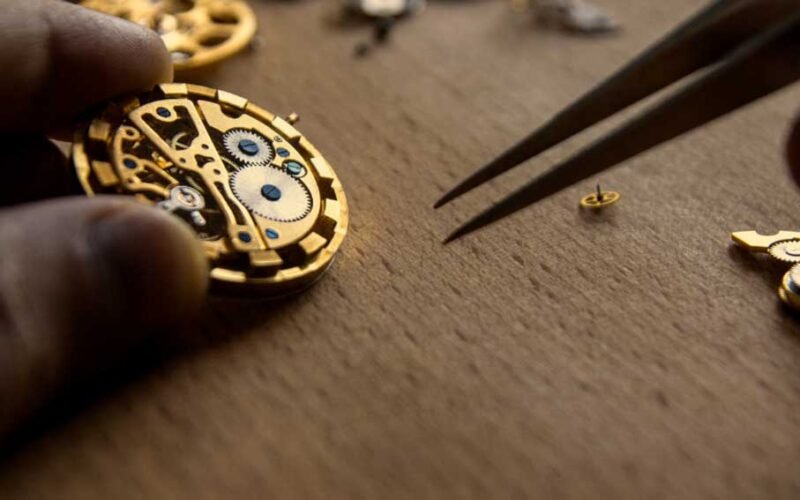Mechanical clocks are not just functional timepieces; they are often cherished heirlooms, decorative elements, or collector’s items with historical significance. Over time, even the most meticulously crafted clock mechanisms can wear down, requiring repair or replacement to restore their functionality and preserve their aesthetic value. While some clock enthusiasts might be tempted to tackle these repairs themselves, certain situations call for expert intervention. In this guide, we’ll explore the scenarios in which seeking professional help for a replacement clock mechanism is essential.
Understanding the Basics of Mechanical Clock Mechanisms
Mechanical clocks operate through a series of gears, springs, and weights that work together to measure time accurately. These mechanisms are often intricate and require precision engineering. The main components include:
- The Mainspring or Weights: Provide the energy that drives the clock.
- Gears and Escapement: Regulate the release of energy to keep the clock running at a consistent pace.
- Pendulum or Balance Wheel: Ensures the clock’s accuracy by maintaining a steady rhythm.
Due to the complexity of these mechanisms, even a minor issue can affect the clock’s performance, making professional evaluation necessary in many cases.
Common Issues with Mechanical Clocks
Before deciding whether you need expert assistance, it’s helpful to recognize common problems that affect mechanical clocks:
- Inaccurate Timekeeping: If your clock is running too fast or too slow, the issue could be with the pendulum, escapement, or internal lubrication.
- Stopped Movement: A clock that has stopped entirely might have a broken mainspring or excessive dirt and grime in the gears.
- Chiming Malfunctions: Irregular or absent chiming often points to problems with the striking mechanism.
- Visible Wear and Tear: Fractured gears, bent components, or worn-out bushings are signs of aging that require immediate attention.
While some issues can be resolved with cleaning or minor adjustments, others demand a replacement clock mechanism and professional expertise.
When to Seek Expert Help
-
The Clock Has Sentimental or Historical Value
If your clock is an antique, a family heirloom, or a piece of historical significance, attempting a DIY repair can result in irreversible damage. Experts in clock restoration have the knowledge and tools to preserve the integrity of such pieces while ensuring their functionality.
-
The Mechanism Requires Custom Components
Older clocks often have unique, custom-made parts that are no longer available off the shelf. Clock repair specialists can craft or source the necessary components to fit seamlessly into the existing mechanism.
-
Complexity of the Mechanism
Modern mechanical clocks might not be as intricate as their antique counterparts, but they still demand precision handling. If you’re unfamiliar with the inner workings of clock mechanisms, attempting repairs could lead to further damage.
-
The Need for Specialized Tools
Repairing or replacing a clock mechanism often requires specialized tools, such as gear pullers, depthing tools, and mainspring winders. Professionals have access to these tools and the expertise to use them correctly.
-
Replacement Clock Mechanism Is the Only Option
When a clock’s original mechanism is beyond repair, replacing it might be the best solution. Professionals can ensure that the new mechanism is compatible with the clock’s design and functions as intended.
-
Concerns About Aesthetic Integrity
Many clocks are as much about visual appeal as they are about timekeeping. Professional clockmakers have the skills to maintain or restore the clock’s original aesthetic while addressing the mechanical issues.
The Risks of DIY Clock Mechanism Replacement
While replacing a clock mechanism might seem straightforward, there are several risks associated with DIY efforts:
- Misalignment of Components: Improper installation of gears and springs can lead to functional issues.
- Damage to the Case or Dial: Mishandling during repairs can harm the clock’s exterior, reducing its value.
- Over-oiling or Under-oiling: Applying the wrong amount of lubricant can cause more harm than good.
- Loss of Precision: Without the proper adjustments, the clock might lose its accuracy.
Given these challenges, it’s often best to entrust the task to professionals who can guarantee quality results.
How Professionals Approach Clock Mechanism Replacement
Expert clockmakers follow a systematic approach to diagnose, repair, or replace clock mechanisms:
-
Thorough Assessment
The process begins with a detailed evaluation of the clock to identify the root cause of the issue. This includes checking for wear, misalignments, and dirt buildup.
-
Cleaning and Lubrication
Before replacing a mechanism, professionals often clean and lubricate the existing components to ensure optimal performance.
-
Compatibility Check
If a replacement clock mechanism is required, they will verify that the new mechanism matches the clock’s specifications, ensuring a perfect fit.
-
Precision Installation
Experts handle the delicate process of installing the new mechanism, aligning all components to ensure smooth operation.
-
Testing and Calibration
Finally, the clock is tested and calibrated to guarantee accurate timekeeping and proper functionality of all features, including chimes and strikes.
Signs You Need a Replacement Clock Mechanism
Sometimes, repair is not enough, and replacing the mechanism becomes necessary. Here are the signs to watch for:
- Repeated Failures After Repairs: If the same issues keep recurring, the mechanism might be too worn to function reliably.
- Severely Damaged Gears or Springs: Broken components that cannot be repaired indicate the need for a replacement.
- Modernization Needs: In some cases, upgrading an old clock with a modern mechanism can improve its reliability while retaining its vintage charm.
Finding the Right Professional for the Job
When seeking expert help for a replacement clock mechanism, it’s essential to choose a reputable clockmaker or repair service. Consider the following tips:
- Check Credentials and Experience: Look for professionals with certifications from organizations like the American Watchmakers-Clockmakers Institute (AWCI).
- Read Reviews: Online reviews can provide insights into the quality of service and customer satisfaction.
- Request a Quote: Before committing, ask for an estimate to understand the cost of repairs or replacement.
- Ask About Warranty: A reliable professional should offer a warranty on their work.
Maintaining Your Clock Post-Replacement
Once your clock has a new mechanism, proper maintenance is key to extending its lifespan:
- Keep It Clean: Regularly dust the exterior and avoid exposing the clock to excessive moisture.
- Wind Carefully: If your clock requires manual winding, follow the manufacturer’s instructions to avoid over-winding.
- Schedule Regular Servicing: Have your clock checked by a professional every few years to address any minor issues before they escalate.
Conclusion
Mechanical clocks are timeless treasures that deserve expert care. Whether your clock holds sentimental value or historical significance or simply serves as a functional piece in your home, knowing when to seek professional help is crucial. From diagnosing complex issues to installing a replacement clock mechanism, experienced clockmakers can restore your timepiece to its former glory, ensuring it continues to bring joy for generations to come.
Don’t leave your precious clock to chance. If you suspect it needs repair or replacement, contact a trusted professional to keep it ticking perfectly.










